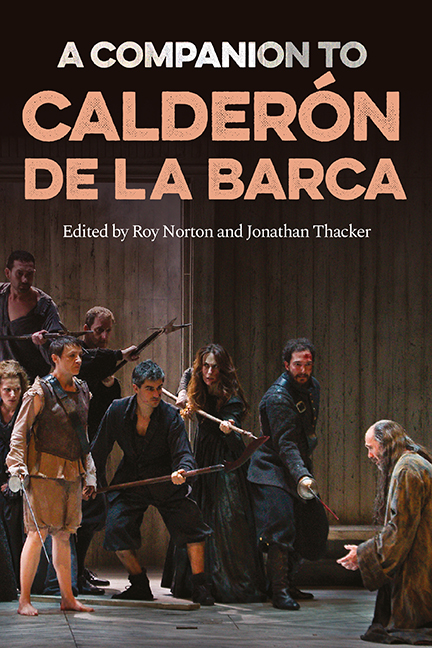Book contents
- Frontmatter
- Dedication
- Contents
- List of Illustrations
- List of Contributors
- Acknowledgements
- List of Abbreviations
- Introduction
- 1 Biography and Context
- 2 The Calderonian World
- 3 The Playwright’s Craft: Calderón and the Great Theatrical World of Early Modern Spain
- 4 La vida es sueño
- 5 The Honour Plays of Calderón
- 6 Calderón, the Comedian
- 7 Mythological Court Spectacle Plays
- 8 Religious comedias
- 9 Calderón’s ‘Sacramental, Allegorical and Historical’ autos
- 10 Calderón’s graciosos
- 11 Calderón and Visual Art
- 12 The Staging of Calderón’s Theatre
- 13 Calderón’s European Reception from Romanticism to the Twentieth Century
- 14 The Reception of Calderón in the Hispanic World
- Appendices
- Consolidated Bibliography
- Index
- Tamesis • Companions
Introduction
Published online by Cambridge University Press: 07 October 2022
- Frontmatter
- Dedication
- Contents
- List of Illustrations
- List of Contributors
- Acknowledgements
- List of Abbreviations
- Introduction
- 1 Biography and Context
- 2 The Calderonian World
- 3 The Playwright’s Craft: Calderón and the Great Theatrical World of Early Modern Spain
- 4 La vida es sueño
- 5 The Honour Plays of Calderón
- 6 Calderón, the Comedian
- 7 Mythological Court Spectacle Plays
- 8 Religious comedias
- 9 Calderón’s ‘Sacramental, Allegorical and Historical’ autos
- 10 Calderón’s graciosos
- 11 Calderón and Visual Art
- 12 The Staging of Calderón’s Theatre
- 13 Calderón’s European Reception from Romanticism to the Twentieth Century
- 14 The Reception of Calderón in the Hispanic World
- Appendices
- Consolidated Bibliography
- Index
- Tamesis • Companions
Summary
To the sound of discordant drums a medieval Castilian prince – the future Enrique II, of Trastámara – is hurled from his horse across the bare stage, apparently lifeless; from on high a bold Russian noblewoman, in male attire, descends, distressed and defiant, lost in the mountainous borderlands between her country and Poland, her horse – a would-be hippogryph – left to the wolves; to the music of shawms, revealed asleep behind a curtain at his writing desk, Henry VIII of England emerges from a troubling dream, seemingly prompted by the alluring Anne Boleyn; in a whirl of shawls, a disguised woman leads her confused lover into the countryside to warn him that his powerful rival plans his murder that very night. Those who flocked to the playhouses of Golden Age Spain from the 1620s onwards to see and hear the new play by Pedro Calderón de la Barca might be transported to locations known or only imagined: to a North African beach, across the ocean to the New World, to heaven, to an exotic foreign court, Old Testament Jerusalem, St Patrick's Ireland, the battlefields of Flanders, a country house, a street in Madrid, a lonely cave, or the Alpujarra mountains. Almost all plays for the corral [public playhouse] began in medias res, capturing the attention of the boisterous, socially mixed public of the day. The audience's greetings and conversations would be interrupted by the actors’ off-stage shouts, music, song, noisy or spectacular entrances, revelations, stage action, colourful costume, or witty verse dialogue, inviting these men and women to enter their universe of the imagination, to begin to decipher the codes and conventions, the visual and aural clues of the comedia [Golden Age play], the idiosyncratic dramatic art form by which they were so royally entertained.
Calderón, a consummate purveyor of this popular yet refined form of theatre, was born in Madrid in January of 1600, at the dawn of the new century, two years into the reign of Philip III (1598–1621), and he came of age as a playwright in the optimistic early 1620s as the reign of Philip IV (1621–65), Spain's next Habsburg monarch, sixteen years old on his accession, took shape. He would be a major figure in the cultural life and dazzlingly theatrical court of the Spanish ‘Rey Planeta’ [Planet King].
- Type
- Chapter
- Information
- A Companion to Calderón de la Barca , pp. 1 - 14Publisher: Boydell & BrewerPrint publication year: 2021



